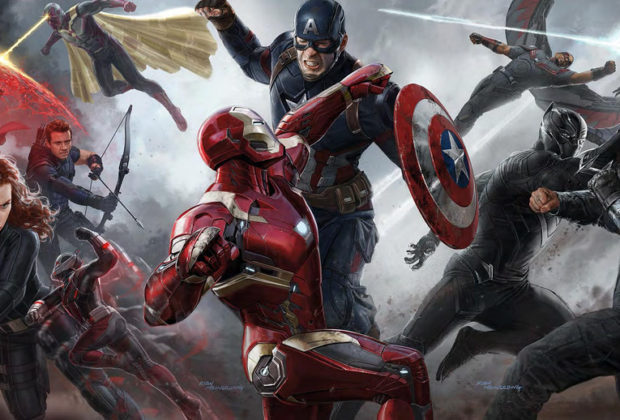Marvel resurrects the epic genre.
by Zac Alstin
Marvel's Infinity Saga is a ten-year series of 22 interwoven superhero films that culminated in the three-hour extravaganza Avengers: Endgame.
And with this accomplishment Marvel has resurrected the epic genre for a cinematic age.
Frequently described as "epic" for its sheer scale and ambition, the Saga is also epic in this literary sense, and it represents a unique moment in American culture.
Epic poems
Epic poems bring to mind ancient works like Gilgamesh, the Iliad and the Odyssey, the Mahābhārata and Ramayana, Beowulf and the Song of Roland, to name a few.
The function of these epic poems was to illustrate and exemplify the virtues and values of the civilisation they belong to, through the struggles and triumphs of its heroes.
The epic genre is defined by loose stylistic and thematic criteria, not all of which translate to film. But the essence of the epic is there:
"it is a long verse narrative on a serious subject, told in a formal and elevated style, and centered on a heroic or quasi-divine figure on whose actions depends the fate of a tribe, a nation, or (in the instance of John Milton‘s Paradise Lost) the human race".
Other key characteristics include catalogues of heroes and warriors, vast geographic range and disparate locations, depictions of superhuman and martial feats, extensive descriptions of the hero arming himself, intervention by gods and other supernatural beings, and often a terrifying journey to some form of underworld or land of the dead.
Has Marvel succeeded in creating an epic for our era? And if so, what virtues and values does it represent to us?
If there's a central hero of the Saga it would have to be Iron Man. And the values depicted by Tony Stark? Genius intellect, cutting-edge scientific and technological expertise, untold wealth, and an indomitable, yet irreverent self-confidence.
The very nature of Stark's superhero arc epitomises wealth and technology turned to the noble end of protecting humanity from threats local and extra-terrestrial alike.
In fact the underlying theme of the Infinity Saga and the many heroes who comprise it is the use and abuse of technology.
The personal power of many heroes depends directly or indirectly on technological advances: Bruce Banner, Peter Parker and Steve Rogers each owe their powers to having been bitten, injected or exposed to some kind of sciencey substance.
Ant-Man and the Wasp, Iron Man and War Machine, Falcon and the Winter Soldier, Peter Quill, Black Panther and everyone in Wakanda depend on uniquely advanced technology for their strength.
Finally, Thor and the Asgardians, the Guardians of the Galaxy, Captain Marvel and anyone else I've forgotten are extra-terrestrials, the modern day equivalent of gods and demigods, whose "normal" powers, abilities and technology are superpowered by human standards.
Thanos, the villain of the Saga, plans to destroy half of all life in the universe, hoping to restore balance and prevent the collapse of whole planets and civilisations through overpopulation.
His is a benevolent cataclysm, designed to save the universe from itself, yet he pursues his goal with the utter ruthlessness of a tyrant.
In marshalling the Avengers and their allies against Thanos, the Infinity Saga champions humanity, technological advance, and faith in progress against the kind of destructive consequentialism that would cull whole populations for the greater good.
It's not a refined argument or a nuanced one. But Thanos is depicted with empathy and intelligence even though his plan is brutal and incomplete.
He recapitulates on a much bigger scale the villain from Avengers: Age of Ultron, in which a sentient A.I. programmed to defend the Earth from threats instead decides (or realises?) that humanity is the greatest threat and must be eliminated.
Finally, in Captain America: Civil War the ambivalence of power as both protector and threat comes home to the Avengers themselves, as the team is divided over whether to accept some form of governmental authority, to put the superheroes themselves on a leash.
An American epic
These themes are quintessentially American in their championing of progress, wealth, and individualist technological solutions in the face of unilateral, authoritative and morally brutal ones.
It's redundant to point out that the heroes of the tale are moral exemplars, but significant that the morality they portray is respectful of the value of individual human life, friendship and family while casting doubt on government, bureaucracy (Hail Hydra, anyone?) and "too perfect" solutions to Earth's perennial problems.
This might seem stock-standard for contemporary action movies but that's the point: the epic exemplifies our values in what is still an Anglo-American civilisation.
We are still happier to imagine a rough-and ready bunch of cowboys heroes always saving the day than a New World Order, or an old one.
It's not a Chinese epic where the heroes protect the Emperor from foreign infiltrators and palace intrigue, nor is it a British epic where the heroes rally to restore the Once and Future King.
Libertarian themes permeate the Saga where the ultimate hero is essentially a billionaire one-man-army whose intellectual virtues as a prodigious inventor translate seamlessly into the courage, justice, and fortitude of a hero.
And at the heart of the Saga, the motivation behind the heroics, is love of family, love of friends, and love of humanity even to the point of self-sacrifice.
The role of the epic
The re-emergence of the epic genre at this time is fascinating. Since the Infinity Saga began a decade ago, we have seen increasing fractionalisation and fragmentation of society driven in large part by the diversification of media consumption through the internet.
People are able to watch, read and listen to an ever more diverse and specialised range of media, and one by-product of this change is that we have fewer shared narratives and shared perspectives.
The return of the epic genre could mean that we are finding new (or very old) ways of connecting with each other via a shared story. Other highly popular series like Game of Thrones suggest that the MCU is the standout, rather than the exception in this search for narratives that bring us together.
The epic is well-suited to this because it contains diversity within a unified story and a coherent theme. It takes in stride vastly different perspectives yet shows we can still be united by the best of what we hold in common. After all, it’s not one superhero taking on Thanos, but every superhero.
And so the worldwide success of the Infinity Saga is something to appreciate for the way it reinforces and depicts many important virtues and values, including the basic dignity we all share despite our differences.
Originally appeared on MercatorNet | Image Credit: BagoGames/Flickr/cc




 (909) 335-8100 ·
(909) 335-8100 ·  (909) 335-6777
(909) 335-6777 Email:
Email: